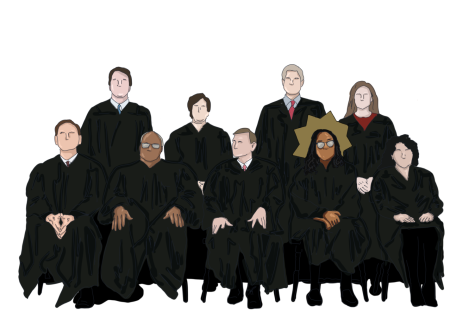The political game of Supreme Court confirmations
April 21, 2022

On April 7, 2022, Ketanji Brown Jackson made history by becoming the first Black woman nominated to the Supreme Court in its 233-year history. Jackson was confirmed with all members of the Democratic caucus and three Republicans voting in favor with 47 Republicans voting against. This nomination is truly a historic moment which should be celebrated, but we must acknowledge the political system that gave Jackson a seat at the table (or bench) in the highest court in the United States.
Many were ecstatic at this confirmation, myself included. Despite my joy, however, I can’t help but think that just because the system worked out in my favor this time that means we should view the Supreme Court as a legitimate form of impartial justice.
Don’t get me wrong, the confirmation of Ketanji Brown Jackson is a historic moment, but the Supreme Court has never been an impartial form of government and we must stop pretending like it is. Just because we have had another confirmation of a liberal judge does not mean that we should put our full faith back into the system that elected Jackson. These reactions are incredibly hypocritical, as we cannot continue to condemn politics in our justice system while also pushing for partisan nominees that agree with our politics and celebrate when they are elected.
The Supreme Court is supposed to be void of any political ties to the two-party system in the U.S., however, the designations of “liberal” or “conservative” feel eerily similar to Democrat or Republican. The fact that all justices have to go through Senate confirmations makes their ties to the party even more apparent. The argument that the Supreme Court is not tied to the political impulses of the two-party system is becoming increasingly faulty, which has led many to start to question the legitimacy of the institution.
As of now—even with the retirement of Stephen Breyer and the confirmation of Ketanji Brown Jackson—conservative judges still have a supermajority within the Supreme Court, with five conservative-leaning judges and three liberal judges. Conservatives gained this massive majority during the Trump administration with the confirmations of Brett Kavanaugh and Amy Coney Barrett.
A tweet by the Daily Show sums up this split perfectly, stating, “It’s official: Ketanji Brown Jackson will now be the most powerful Black woman in America to have her opinions dismissed by two-thirds of her co-workers.”
Due to its significant ties to the legislative branch, the Supreme Court is no longer a neutral arbiter of law and instead is becoming a partisan tool with an extreme amount of power. The nomination of Supreme Court justices has become a game of luck, dependent on who is president and who has the Senate majority. This has created a political game on both sides where senators will not approve of judges nominated by the other party, regardless of their qualifications. So what happens when luck is not in our favor?
If Republicans gain back control of the senate, we will see a repeat of stalling techniques shown within the last years of the Obama era, leading to many liberal judges not being confirmed to the Supreme Court and other districts. The issue of bipartisanship, therefore, does not just affect the legislative branch, but the judicial as well. This form of stalling happens on both sides of the aisle and continues to delegitimatize the Supreme Court. The politics of nomination seems to only be celebrated when it works in favor of one side’s political beliefs, defeating the purpose of the Supreme Court.
The fact that justices in the Supreme Court do not have term limits further complicates this process. Unlike elected representatives, we will be stuck with whoever is nominated for decades with little to no citizen input. The game of who is in power during times of nomination, therefore, does not just affect people for a couple of years, but for decades. Term limits are directly connected to the fact that judges are supposed to be impartial and must be reevaluated under the impression that they are not.
We have given immense lifetime power to nine people that are still tied to their political, religious and moral interpretations of justice. No one can ever be impartial and the Supreme Court continues to gain more power and unfounded legitimacy under this false impression. This is not an argument to fully dismantle our system of justice, but to admit that our justice system is not apolitical but directly tied to political affiliations.
The amount of power that justices have because they are supposedly not tied to politics has created an institution that goes completely unchecked and will continue to affect how legislation is enacted and interpreted. Jackson’s nomination may be a win for liberals and democrats, but I for one cannot continue to put my faith in a system that is just luck of the draw.





